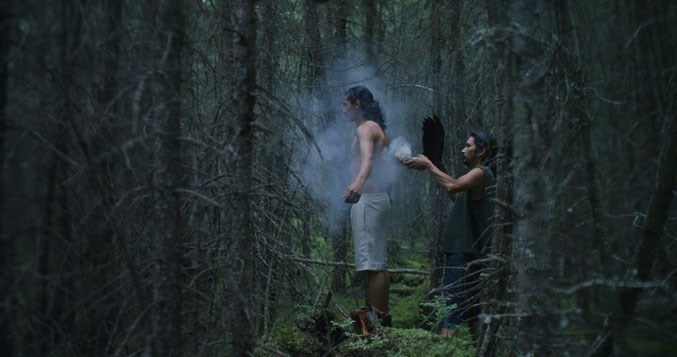Tonight’s the night for the silver screen action to commence on one of the longest running international Indigenous film festivals in the world. Dreamspeakers International Indigenous Film Festival starts its four-day extravaganza with Kéwku, a visual poem about British Columbia’s Ralph Phillips, a troubled man who finds healing through sage in the First Nations community of Secwepemculw. It’s a short film at 10 minutes but is simultaneously soothing and stimulating. It’s also the award winner for Canadian Short Film at the fest. That award and all the others actually get announced during the opening night ceremony immediately preceding the film. Right after Kéwku screens tonight at 7 p.m., people can watch The Road Forward, documentary director Marie Clements’ tribute to those who fight for First Nations rights, which will then be followed by El Sueño del Mara’akame, the story of a young Huichol Indian in Mexico who is struggling between following his musical dreams and adhering to the traditions of his family. And then, of course, there’s still three more days of incredible shorts and feature length films to enjoy. How marvelous is that to have such a strong assortment of Indigenous film programming all in one place. “It’s probably one of the best things about the work that I do, which is the ability to actually see such a variety of art,” explained festival producer Christine Sokaymoh Frederick, noting how well it helps to cap off the summer festival season in Alberta’s capital region. “It’s wonderful. There’s just so much to do. I always tell youth that there is no reason to ever be bored in this city.” She said that Clements’ film would be “stunning.” “It is absolutely one of the reasons why I think I’ve been intrigued by Indigenous arts: how we reflect on our own history by using all of the contemporary artistry that’s available to us. It’s just got a kicking cast, extremely well-written, a lot of heart.” “When we go through the selection process, we do adjudicate each of the films based on merit and impact and even by ability. There are ones that rise to the top in all of those quadrants.” Some of the more than 15 other standout selections include Los Ojos del Camino, Before the Streets, Nacimientos (Giving Birth), and ôtênaw, filmmaker Conor McNally’s look into the oral storytelling of Edmonton’s Dwayne Donald. Attendees can also take in a gripping narrative called Cree Code Talkers, a short film that details the story of Charles ‘Checker’ Tomkins, a Métis member of the Royal Canadian Ordnance Corps who spoke fluent Cree and helped Allied Forces win against the Axis powers in the Second World War. These Canadian and American codetalkers were sworn to secrecy and have never been formally recognized by either government. Frederick said that watching these films is one way of helping this country’s vast Aboriginal community to attain healing for so many wrongs. “What is art to Indigenous people? My understanding from my elders is that art began as participatory processes that were embedded in our ceremonies. They were meant to communicate our humanity to the Creator and each other. When I look at the current condition of our society, we are at a time of reconciliation,” she offered. “It’s hard work. We don’t just reconcile. We have to work at rectifying and redressing human rights violations and relationships that were traumatized. We were stripped of our culture and our identities. When Aboriginal people practice art … that is all immediate redress of those human rights violations. It’s all of us rebuilding that culture.” All screenings are set for the Metro Cinema, 8712 109 St. in Edmonton. Tickets are $15 each except for select events. For full programming and details, visit www.dreamspeakers.org.




